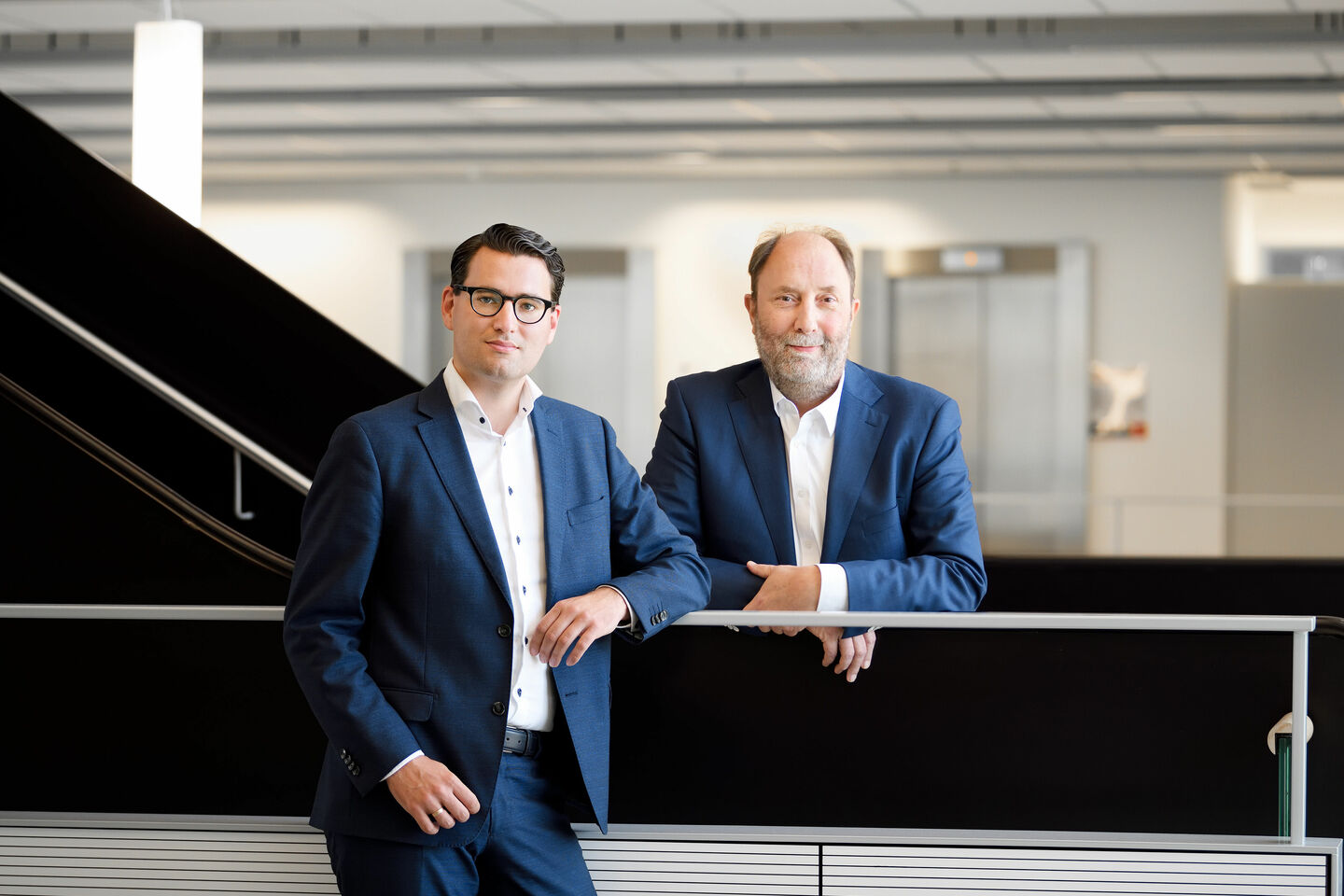
“There is always money for a good idea”
Joint interview Gerrit Kroesen and Mark Boneschanscher
Should we simply give scientists a bag of money so they can focus on research and do not have to worry about funding it? Gerrit Kroesen and Mark Boneschanscher agree that is not the way to move towards an ideal future. Both believe that healthy competition for research money actually keeps scientists sharp. “However,” they add, “we have gone too far in this respect.” The Dean of the Faculty of Applied Physics and the Managing Director of EIRES (Eindhoven Institute for Renewable Energy Systems) became acquainted years ago in their joint search for the right balance. In the following conversation, they discuss the scientific plateau in the Netherlands and make a plea for greater contemplation.
Heroes Past and Present
The theme of this lustrum year, which marks TU/e’s 65th anniversary, is ‘Heroes like you.’ In keeping with this theme, Cursor will publish a series of double interviews throughout the year with the motto ‘Heroes Past and Present.’ TU/e employees and students with proven track records, still working at the university or no longer under employment, are matched with their counterparts from today. In all possible fields: science, policy, or student life. This time we give the floor to Gerrit Kroesen, Dean of the Faculty of Applied Physics, and Managing Director of EIRES (Eindhoven Institute for Renewable Energy Systems), Mark Boneschanscher.
Their first meetings were scientific in nature. Later, in 2017, whilst they were writing up the sector plans for the disciplines of physics and chemistry, they delved deeper, unhindered by the age difference, like a magician and his student. Gerrit still remembers this clearly. “I saw a lot of affinity. Not the same arguments, but the same way of thinking, the same system for approaching things, for distinguishing between primary concerns and issues of lesser importance.”
Mark: “I feel flattered [laughs]. No seriously, I have always enjoyed working with you on strategic matters, and that was it really, right? The interfaces between science and strategy—this is a topic we both approach with a strong drive and passion for fundamental science and its applications in the social realm.”
Gerrit: “Built on science, not monomaniacally, but with a broad view, including social issues and argumentation, and certainly no power politics. I don’t know whether we both have an allergy to that, but I certainly do.”
Mark: “Oh yes, me too. It has to be about the content.”
Youngster and bag carrier
After completing his PhD at Utrecht University, Mark started working at FOM in 2014. This is how he became involved in the drafting of the sector plans for physics and chemistry, as a "youngster” and “bag carrier”. “I got sucked into it, and then Gerrit and I came into much more intensive contact. I am a little younger, but ever since it has always been about the future of the disciplines and the field—about how to present that strongly in the changing landscape of science policy.
I think that, of all the Dutch universities, the TU/e has held on to the traditional disciplines the longest. I think that is a wonderful thing. This is the only university where you still have different deans for each discipline. A dean of physics? You simply cannot find one anymore anywhere else in the Netherlands. It has been merged everywhere, at the very least into the technical and natural sciences, and at the general universities into the very broad faculty of science. I was trained in the hard discipline, so that is where I come from, and I think we both share a great passion for it.”
A jungle of rules
According to Mark, the Dutch universities have gone too far in their multidisciplinary thinking. “So much so that we have forgotten that this way of working is only possible if you have strong disciplines and people who know their field and seek cooperation from there. You have to train people to be experts in their particular fields, but also ensure they are able to connect with others. Now, on the national level, we are very much focusing on that capacity to connect and cooperate. Many funding programmes require at least three disciplines, two companies, four universities, this many applications, etc.—it is becoming a jungle of rules. I don’t think that is sustainable in the long term.”
Gerrit: “I don’t think so either. You see this trend to broaden the focus, even beyond the domain of science. At the moment, however, the tide seems to be turning a little. When it comes to the disciplines, NWO is currently searching. The physics and chemistry sectors have been brought under the domain of Exact and Natural Sciences (ENW). The old FOM organisation has disappeared as the connecting knowledge centre, the rubber band that—together with the Netherlands Physical Society (NNV)—held Dutch physics together.”
Mark: “First you had the Council for Physics and Chemistry, whereas now you have a separate council for physics. I am curious to hear what you think of that?”
Gerrit: “I would have preferred to keep the physics and chemistry council together. I thought that was a stronger concept because it had already proven itself in terms of its lobbying power. If Robbert Dijkgraaf, Bert Meijer, and Jos Benschop go and talk to the ministry, that has an impact. Now everyone is writing their own sector reviews.”
Mark: “Exactly, and now the risk is that it becomes a question of obligatory money grabbing. We started writing plans to show what physics, chemistry, and later also the broader disciplines of science and engineering stood for—what future challenges they set out for themselves, and how they were going to tackle these. Whilst money was a means to reach certain goals, it was clear that the plan could still be carried out without it, albeit perhaps in a less powerful way.”
Gerrit: “I think that now, we are pulling away from that again. The second sector plan was submitted to the ministry well in advance, so that parties would have sufficient time to look at it during the cabinet formation. The timing is right. Unfortunately, forming a new government has turned out to be a major disaster. Whether the case is correct and whether there is attention for such a theme in these times of political instability, we will have to wait and see.”
Mark: “Some of the powerful players who previously supported the sector plans are now aiming towards a different concept, for example a national programme similar to Horizon Europe. Although this may well save fundamental research, it ignores the self-organisations of the disciplines. Will we hold on to the disciplinary faculties in Eindhoven? I feel strongly in favour of this because it has its own charm and power. Do you experience any pressure in that respect?”
Gerrit: “Every few years, this comes up as a point of discussion at our university. The issue is as old as Methuselah—a recurring discussion with the question: Should we aim for fewer, larger faculties? The latest proposal consisted of three faculties: Science, Technology, and Design. You have to ask yourself: What do we gain from this? In terms of budget and organisation, we are simply too small for this. The Board of Governors would then talk to three deans instead of nine. Will that make things easier?”
Research institutes
Mark: “What we at the TU/e have done very well, is setting up institutes that facilitate the connection between the faculties—multidisciplinary cooperation whilst maintaining strong disciplines. That is why I ended up here. With the Institute for Complex Molecular Structures (ICMS), we have found a model that works extremely well. I think it is the only interfaculty institute in the Netherlands that has existed for over ten years. Most other university institutes are thrown out with the garbage after five years. If we set up the institutes in Eindhoven in such a way that they do not compete with the faculties and only provide that connection, you create a better springboard for multidisciplinary funding and, ultimately, a win-win situation.”
They both consider the constant complaint that researchers have to invest too much of their time and energy into applying for research grants somewhat exaggerated.
Gerrit: “Money is almost the only instrument that can influence behavior. It has a motivating effect. Certainly, the balance has been upset. Competitive fundraising demanded so much, both of the people and of the universities, that it became untenable. The new sector plans bring about a turnaround. The competition must persist, but it must be well balanced. You have to ask yourself: What are our strong points, in which areas do we want to grow, in which discipline do we want to strengthen ourselves? The sector plans also lead to more consultation on the national level. Science has gained stature in the parliamentary consultations.”
A scientific plateau
Mark: “Dutch physics and chemistry are amongst the best in the world. We have talent and great scientific impact, also on the social level. Just look at ASML, for example. However, it is a plateau. The universities are all very good, and hence that plateau has no peak, like Harvard or MIT, for example. Historically, we have a stronghold of science and technology disciplines, and physics and chemistry in particular. How do you best preserve that position? It is precisely as Gerrit says: The competition has gone too far.
Whilst with the current sector plans, we are making a return, simply handing over bags of money is not a structural solution. We must guard ourselves against that, because ‘free money’ now seems to lie under every bush. I am a bit afraid of that, for example looking at the Dutch National Growth Fund. If you invest such a huge amount of money in the same way as the FES money was invested several years ago, it can give an enormous boost to a single area. However, if this is not also structurally established in the universities and research organisations, the subject will quickly die as soon as the money runs out. The same is true for large sums of money from the European Union. Fortunately, at the TU/e, we have Robert-Jan Smits, the president of the board, who serves as a kind of antenna and gives us insight into what is coming up, so that the deans and institute directors can quickly determine their strategy. I also hope that the science deans will take up these kinds of issues on the national level.”
The sector plans also lead to more consultation on the national level. Science has gained stature in the parliamentary consultations
From loose sand to a coherent club
Gerrit: “Ten years ago, the consultation of the science deans was more akin to loose sand. Now it is a coherent club in which we are quick even to discuss the details. It is a club that was initially merely tolerated by the university boards. They did not like the fact that the deans were making decisions amongst themselves about things they had to deal with. That sentiment has disappeared. The Executive Boards have seen that it works, and that is just as well, because the academic landscape is changing enormously. The focus of funding has shifted—away from the disciplines, towards social themes. Whilst this is understandable, it is also dangerous.
With the current sector plans, we are able to keep the disciplines going as long as all university boards continue to do what they are supposed to do, namely, pass on the money. At the TU/e, we have thus far been doing very well. However, who knows, perhaps one day it will be absorbed by the organisation, and then the misery will start all over again. As an institution and as a ministry, you must guard yourself against that. Sometimes, I get the impression that these are all very much systems of control. If a wrong decision is made, it will come back to haunt you at some point. However, it may take five or ten years and a lot of damage may have been done, but the organisations are strong enough to dig their way out of it.”
Bouncing back
Mark: “After the church, the universities are the oldest organisational system in the world. It does have some capacity to bounce back, also because people will always want to distinguish themselves in terms of discipline. Research institutes are like ripples in the sea; they change with the social wind. At EIRES, we do energy research. That will be relevant for fifty years, and then it will cease to be. Hopefully, the energy transition will have been completed by then. In the meantime, something else is bound to emerge; an institute for combating viral diseases, for example. These are changeable currents. However, if you ask a scientist ‘What are you?’, he or she will say: chemist, physicist, mathematician, or biologist. They will not say, I am an energy scientist or an AI specialist.”
I am very much in favour of agreeing, university-wide, that meetings will start at five past the hour and end five minutes before
Gerrit: “You have to be careful not to fragment the educational programmes too much. The recognisability of the disciplines is important. It puts us in a good position on the international stage, against the odds. It is not the money, but the content that determines whether a topic survives. Our former college president Henk de Wilt (active from 1996 to 2002, ed.) often said: ‘If an idea is good, the money will follow.’ That is also my experience.”
Contemplation
Mark: “The trick is to give people time to come up with those good ideas, meaning they do not just get to focus on the issues of the day. I see that as an important challenge for this university, which has been aggravated significantly by COVID—by the avalanche of emails and consecutive meetings that are booked into your agenda on a daily basis. Everyone assumes that you are immediately available again. There is no time to let a conversation sink in. In future, I am very much in favour of agreeing, university-wide, that meetings will start at five past the hour and end five minutes before. In this way, you automatically create a moment of reflection.”
Gerrit: “It is about the willingness to contemplate. If you do not make time for that, you will run yourself down. I see this happening around me. In this age of video conferencing, no time is allocated to just walk around. People do not get time to zoom out and reflect upon themselves. I am currently making my annual round of talks with the professors of the faculty. Some 20 to 25 per cent of them are on the verge of collapse. They do not always say it, but we all have the same problem. Teaching online takes up so much more of our time and energy, whilst in the meantime, everything else just keeps going. The pressure is enormous. This is something I have learned in my years as dean: that the importance of zooming out and contemplating becomes greater the higher you get in the organisation. Especially those who are still on the rise and forget to contemplate, will ultimately not manage to get any higher. Taking the time to contemplate is important.”
The interviewees
As a teenager, Gerrit Kroesen (Heerlen, 1958) already had his own little chemistry lab at home. It was only natural that he ended up at the TU/e. In 1977, he entered the campus and only left it for a few years in the nineties.
Ever since he was a student, his specialism has been the field of plasmas. In forty years, Kroesen has virtually covered the entire research field and has numerous publications to his name. In 2000, he became a professor and in 2012 he became Dean of the Department of Applied Physics. Here you can read the full profile of Gerrit Kroesen.
Mark Boneschanscher (Amersfoort, 1985) studied chemistry at Utrecht University and graduated Cum Laude in 2009 for his Master's degree in Chemistry & Physics: Nanomaterials Sciences. In 2014, he obtained his PhD from the same university on a FOM-funded research project on graphene and nanocrystal superstructures.
It was during this time he also took his first steps in science policy as chair of FOM's central works council, in addition to his PhD research. After completing his PhD, this led to a permanent position at FOM as a programme coordinator, where he was involved in the physics and chemistry sector plans and later the science and technology sector plans. When FOM merged with NWO in 2017, he became coordinator of the institute’s liaisons within NWO-I and strategic advisor for NWO-ENW. In September 2019, he joined EIRES, the Eindhoven Institute for Renewable Energy Systems, as quartermaster, where he has been working as managing director since August 2020.
In addition, Boneschanscher is general secretary of NERA (Netherlands Energy Research Alliance) and a member of the advisory board of the IDIC (Israeli-Dutch Innovation Centre).

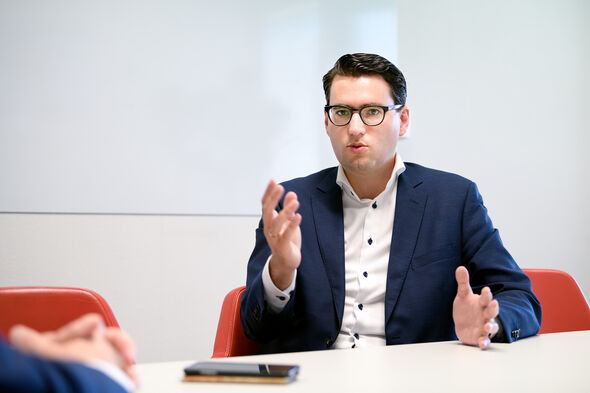
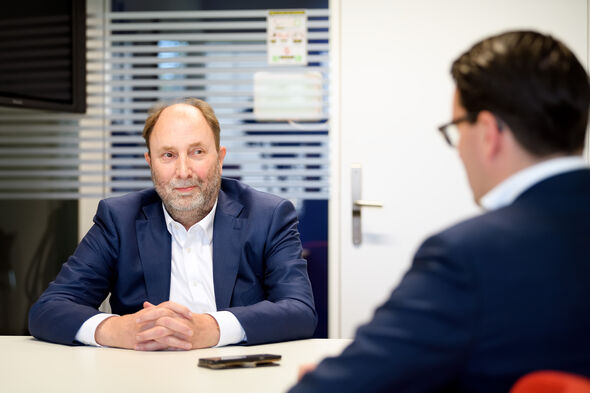
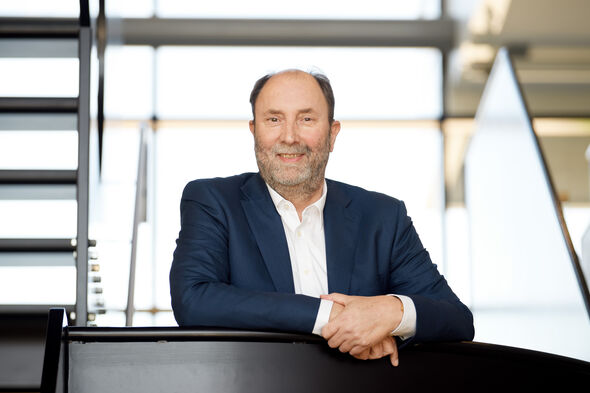
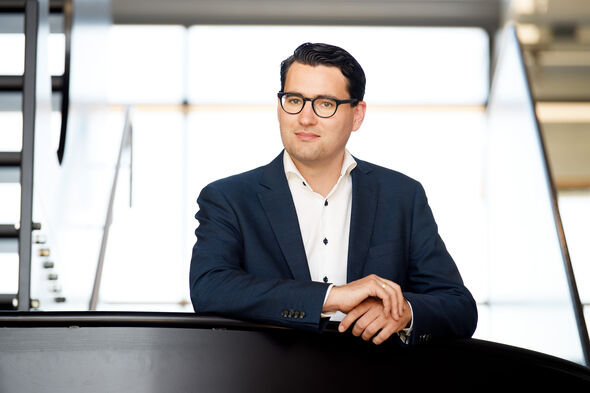
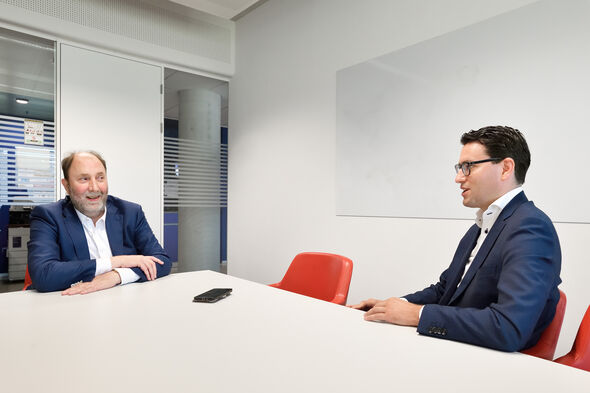
Discussion